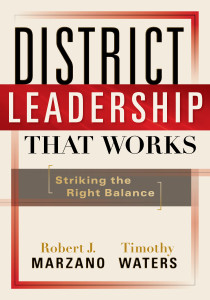District leadership—and particularly whether superintendents impact student success—has been in the news over the last week, thanks to a new report from the Brookings Institution’s Brown Center on Education Policy, provocatively titled School Superintendents: Vital or Irrelevant?
As a former superintendent, and as a co-author of a McREL study and book on district-level leadership, I read the Brookings report with keen interest. Here are a few of their conclusions that surprised me:
- Student achievement does not improve with longevity of superintendent service within their districts.
- Superintendents account for a smaller fraction of student differences in achievement than any other major component of the education system.
- Individual superintendents who have an exceptional impact on student achievement cannot be reliably identified.

They studied relationships between personal characteristics of individual superintendents, such as gender, race, ethnicity, age, and experience and achievement. There is no reference in their report to studying the leadership practices of superintendents.
In our study we were less interested in what superintendents bring to the job (personal characteristics such as gender, age, or ethnicity) than what they do on the job (leadership behaviors). We wanted to learn if the effect of superintendent leadership is positive, negative, or non-existent. We also wanted to learn which leadership behaviors/practices of superintendents, if any, had the largest effects on achievement.
We discovered positive relationships between key, specific practices of superintendents—and, perhaps more importantly, their leadership teams—and higher average measures of district-level achievement.
On this point, the importance of team leadership, our two studies found some common ground. The Brookings report concluded that superintendents do not “single handedly” influence student achievement. We arrived at the same conclusion. While we began our study wanting to answer questions about relationships between superintendent leadership and student achievement, we actually answered questions about district-level leadership teams and their effects on student achievement.
No superintendent can, on his or her own (single handedly), fulfill leadership responsibilities positively associated with higher levels of student achievement. On the other hand, it is hard to imagine a district effectively fulfilling leadership responsibilities through the practices we studied and reported without the commitment of, and direction from, the person at the top of the organization.
We also reported a moderate but positive relationship between superintendent tenure and higher levels of achievement. As a former superintendent, I know first-hand what it takes to plan, implement, monitor, and adjust improvement efforts, as well as to review and align district strategies, policies, protocols, practices, processes, curriculum, instruction, assessment, professional development, and myriad other systems that must work synchronously to meet achievement and instructional goals. These things take time and our findings indicate they do make a difference.
Perhaps, if the Brookings team had focused on leadership practices rather personal characteristics, their findings might have been different.
While I question their focus on personal characteristics rather than variables more likely to influence student learning and achievement, I do hope that their report reinvigorates interest in, and closer attention to, district-level responsibilities and practices that do, indeed, positively influence student achievement.
Dr. Timothy Waters as served as president and chief executive officer of McREL since 1995. He joined McREL in 1993 following 23 years in K–12 education as a teacher, assistant principal, high school principal, assistant superintendent, and superintendent.


Fully agree with this response, Dr. Waters. The McREL work has been a regular component of my courses in educational leadership focusing on specific actions superintendents take to create the conditions for superior performance of teachers and principals. The Brookings Institute analysis did not attempt to identify specific leadership behavior or how it contributed to the other factors they identified. They also lump unexplained variance in test data under a “Students” variable which mislabels other factors that might explain the variance. Appreciate your response and the ongoing research work of McREL.
Absolutely agree effective administration is essential to sustained and improved student performance. Just consider efforts need to change from an educational system where students primarily consume information to one where students are creating and innovating. Huge shifts in pedagogical practice and that takes visionary leadership and a strong administrative team to…”plan, implement, monitor, and adjust improvement efforts, as well as to review and align district strategies, policies, protocols, practices, processes, curriculum, instruction, assessment, professional development, and myriad other systems that must work synchronously to meet achievement and instructional goals. These things take time and our findings indicate they do make a difference.”
Leadership is an essential quality in order to sustain in an organization. It also enhances your personality and helps to build a strong and confident personality on your team mates and higher authority. I fully agree with your arguments Dr.Waters and appreciate your wonderful writing. District leadership should be improved and implemented in a effective way in order to improve students achievements.